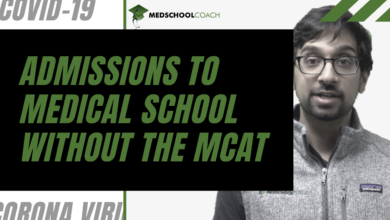The Medical College Admission Test (MCAT) is a critical point in your journey to becoming a doctor. A pre-med student’s medical school application can be negatively affected by a bottom-percentile MCAT score, regardless of your GPA, extracurriculars, and clinical experiences. Conversely, a high score can make you stand out and increase your chances of acceptance.
I encourage students not to settle for the minimum required to reach their target score. If you believe you can achieve a higher score, like 515, I say go for it. Your goal should reflect your potential, not just the minimum requirement.
This is why it is so important to designate study time and prepare for this test.
Once you choose your MCAT test date, focus on your MCAT preparation and stick to a well thought out MCAT schedule for studying. Don’t cram and wait to study at the last-minute — you don’t want to end up needing to retake the exam.
What’s in the MCAT?
The MCAT is divided into 4 content areas:
- Chemical and Physical Foundations of Biological Systems (Chem/Phys): 59 questions focused on physics, biochemistry, biology, general chemistry, and organic chemistry
- Psychological, Social, and Biological Foundations of Behavior (Psych/Soc): 59 questions focused on introductory psychology, sociology, and biology
- Biological and Biochemical Foundations of Living Systems (Bio/Biochem): 59 questions focused on basic biology, organic chemistry, inorganic chemistry, and biochemistry
- Critical Analysis and Reasoning Skills (CARS): 53 questions focused on reading comprehension of a variety of humanities and social sciences
How to Build Your Study Schedule
Before you schedule your exam, consider your other time commitments. For example, if you work full-time, your study schedule may need to span more months than if you’re not working during the school year.
A common mistake I see is students planning long study sessions without being able to protect the quality of those study hours. It’s important to be realistic with yourself. Stay focused, track your progress, and adjust your plan as needed.
How many hours a day should you study for the MCAT? I recommend spending a minimum of 1.5–2 hours a day studying for the MCAT. Experts say to budget for at least 300 study hours before taking the MCAT.
After you’ve calculated the time you’ll have outside of regular commitments, divide 300 by the number of hours per day you estimate to have for studying.
The result will be an estimate of how many days in advance to schedule your test. (If you’re going to set a “rest day” each week or know you won’t be available on Tuesdays, for instance, make sure to calculate that into your study schedule.)
Once you have a general idea of the timeframe you have to prepare, consider taking a diagnostic exam. This full-length exam will help you pinpoint your strengths and weaknesses. You can then gather study materials and plan the amount of time you need to focus on each area.
If your diagnostic score is significantly lower than your goal score (e.g., aiming for 510 but scoring 490), I would advise that you plan to study more than 300 hours. In such cases, I find that aiming for 400-500 hours is a reasonable goal.
Read Next: Use MSAR To Choose Which Medical Schools You’ll Apply To
MCAT Study Schedule Templates
Following a template can be a helpful way to get started on your MCAT study schedule. A template can guide you through dividing your study topics and create a visual to see if the schedule is realistic and manageable.
One-Month MCAT Study Plan
The MCAT is much more intense than other required med school application exams. A one-month MCAT study plan is very ambitious, considering it would require a full-time schedule just to get your prerequisite hours in. This isn’t the best fit for the majority of students.
Can you study for the MCAT in 30 days? You may be able to study for the MCAT in 30 days if you have aced all your previous MCAT practice tests, have the bandwidth to study 8-10 hours a day, and have read all of the prep books.
To study in one month, use this as a general guide:
- Week 1-3: Devote one day (8+ hours) to each major content area, and take one day for recharging. At the end of each week, take a practice test to assess your status.
- Week 4: Review your last practice test and take an AAMC full-length practice test. Review the areas with the lowest performance and dedicate time to practice CARS passages. This week is not about learning anything new; it’s about polishing off what you already know.
Three-Month MCAT Study Plan
Is 3 months enough time to study for MCAT? A three month study plan allots 3-5 hours of study per day, not including rest days. There are plenty of MCAT resources to add to your self-study plan, including flashcards, practice problems, and review books.
- Week 1: After getting a baseline from a diagnostic test, plan to spend 3 hours each day studying individual topic fundamentals.
- Weeks 2-8: Rotate your study block topics each day, and add CARS practice passages and questions into your daily study.
- Weeks 9-11: Start each study week with a practice test, and devote an additional day for test review. Plan your study schedule from your practice test results, and keep up the daily practice of the CARS section.
- Week 12: Take a practice test, and set aside time for test review. Review content areas that gave you the most trouble so you can focus on the areas that you can improve. This is not the time to learn new material.
Six-Month MCAT Study Plan
A 6-month MCAT study plan allows you to pace yourself and really absorb the material. You don’t need to rush into practice tests each week to identify areas of weakness (although we still recommend an initial diagnostic for a baseline).
A longer-term study plan gives you the time to explore each subject area and, in reality, absorb the material more effectively.
- Month 1: Spend 1.5-2 hours each day on a different content area.
- Month 2: Begin to include more practice materials and passage reading.
- Month 3: Review all your content areas. Assess where you are struggling, and give those areas more attention. Toward the end of the third month, take a full-length practice exam.
- Month 4-5: Take bi-monthly practice exams and continue your CARS passage practice readings and questions. Review your content areas, paying special attention to the areas that aren’t sticking as well.
- Month 6: Take weekly full-length practice exams and allot time to review them. Focus on higher yield topics. Take a full-length exam 1 week prior to your actual MCAT.
Read Next: A Guide to Medical Schools That Don’t Require the MCAT
21 Tips to Stay on Track & Avoid Burnout
Studying for the MCAT will push anyone to their limits and can cause test anxiety. You need a study plan to stay on track. Make sure to give yourself enough time to rest and recharge. Burnout is real, and even if you think you’re fine, your brain will appreciate the break.
If you can stick with your MCAT study plan, you will be on your way to success! Here are a few tips that will help you avoid burning out:
- Create a study plan. The MCAT is a big deal and not a test you want to take without an action plan. We’ve given you the roadmap to get started!
- Identify your target score. Check out the MCAT scores for your top choice medical schools to determine your goal score.
- Take multiple practice tests. It’s helpful to know how far you are from your target score and which sections that will require extra attention. Include full-length practice tests so you get a feel for the 7.5-hour MCAT exam.
- Make sure your study plan gives you ample time to prepare for your exam. If you realize you won’t have enough time to study, consider pushing back your test date.
- Break days are a MUST in your study plan. We all need study breaks, and it’s best to pre-plan them so you don’t fall behind in your studies later.
- Ask your pre-med peers for personal study tips. It’s great to get advice from others who have conquered the MCAT exam!
- Front-load your studies. Studying hard early on is much less stressful than cramming later on.
- Make sure your study plan involves content review. Let’s be honest — you’ve forgotten a lot of content from your college courses. Review is essential.
- Switch subjects for review on a regular basis. Don’t study one subject for too long at one time, as the MCAT will not test you on one subject at a time.
- Make sure your study plan involves practice passages. Memorizing scientific facts alone is not enough to reach your target score.
- Consider doing your practice passages and questions in the morning. The MCAT starts at 8 AM. Get your brain used to doing practice questions in the morning.
- Do your best to create test day conditions when taking full-length practice tests. This includes waking up at the same time you’re going to wake up on test day, using a computer (not a cell phone) with a mouse (not a trackpad), and following all the breaks between the sections.
- Pick up a set of MCAT books. College textbooks are great but contain too much information that you don’t need to know for the exam. Study guides are going to be your best friends.
- Make sure you’re using current MCAT books for the new MCAT. The MCAT changed back in 2015, so make sure you’re not using old MCAT books that your older siblings or parents may have used.
- Time yourself when completing practice passages and full-length practice tests. The MCAT is a timed exam, so you need to get used to doing timed questions as well.
- Make sure to complete all the AAMC practice questions. There are no better practice questions than those written by the creators of the MCAT.
- Find a reliable study partner. A study buddy can provide motivation to keep you focused in your studies.
- Help yourself by teaching your study buddy. You know you understand the material well if you can effectively explain it to someone else.
- Toward the beginning of your studies, go through the AAMC MCAT Content Outline and make a list of any unfamiliar terms. The AAMC MCAT Content Outline contains a comprehensive list of all the topics tested on the exam.
- Eat healthy and get exercise. Good nutrition will provide the energy you need to study and exercise will help you relieve stress.
- Consider getting an MCAT tutor. The MCAT is a tough exam to prepare for and getting a tutor to guide you through the process can be tremendously helpful.
We know MCAT prep can be daunting. Study schedules can help make it feel more manageable.
If you are still feeling overwhelmed with your MCAT study preparations, schedule a meeting with the enrollment team with our friends at MedSchoolCoach to see how we can help you boost your MCAT score.
Looking for more MCAT support resources? MCAT Go offers a fantastic audio learning experience and is a great addition to the MCAT Prep App, a mobile learning experience with hundreds of lessons.



